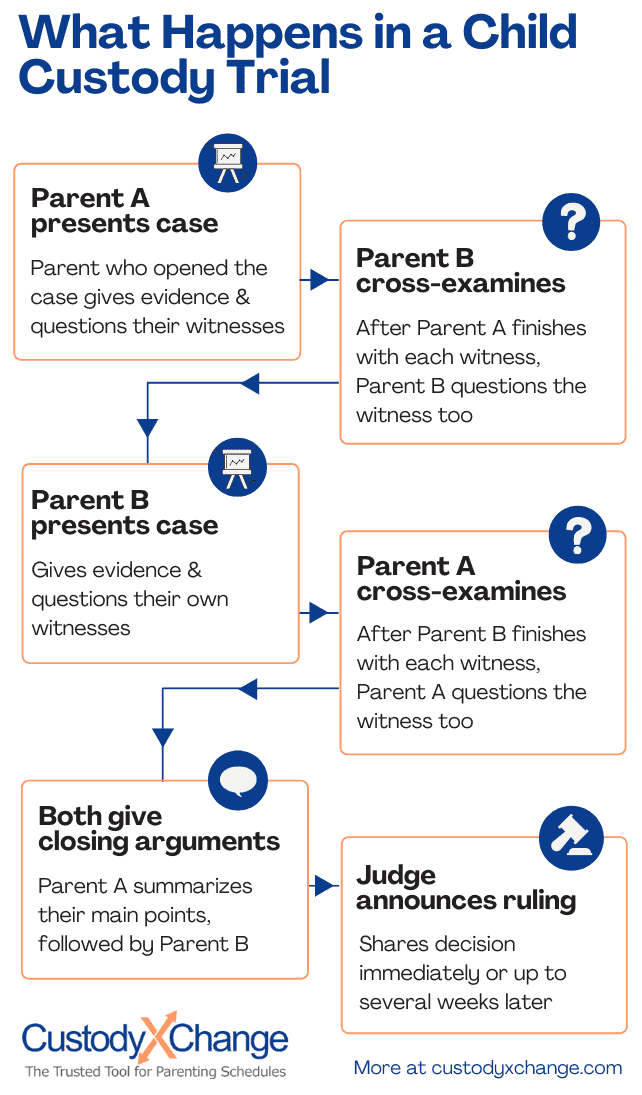Child Custody Trials in Louisiana: What to Expect
Most co-parents reach agreement on how they'll parent their child, thereby avoiding trial. When parents agree on a parenting plan (including a parenting time schedule), the judge approves the agreement as long as it serves the child's best interests.
When parents can't settle, they go to trial, where they call witnesses and present evidence. At trial, the judge makes the final decision.
Before you ask for a trial
Many parishes require parents in a divorce or custody case to attend a conference where a hearing officer encourages them to compromise.
Alternatively, you might have to attend mediation.
Reaching agreement saves you time, money and stress during your court case. You'll receive what's called a consent or stipulated decree if any of these things happen:
- Together, you write up your agreement as a parenting plan, and the court approves it.
- Both of you consent to the custody arrangement the hearing officer recommends.
- The parent who did not submit the custody petition decides not to fight it. The judge grants what was requested unless they suspect it would not be good for the child.
But if you continue to argue, you may receive an interim order from the hearing officer, as they're legally empowered to do this. It's more than just a recommendation. If you get an interim order, you have to follow it until it's replaced by a permanent order.
Asking for a trial
Once your case is open, you can request a trial by making a motion for a hearing. The court will schedule a trial that could be two to six months away, depending on how busy the court is. You don't get to pick the day.
The more issues you have, the more complicated the court expects your trial to be — so if you need the judge to make a decision about property in a divorce, you might wait longer for trial.
If you haven't already had a conference with your local court's hearing officer, you'll likely be scheduled for that. The hearing officer tries to resolve your conflict so you can wrap up your case and won't need a trial.
Sometimes the court appoints a custody evaluator, especially when parents are arguing intensely or when there are allegations of abuse. You can ask the judge to appoint one if you have a reason. A custody evaluator is always a mental health professional, like a psychologist or a social worker. They sort through the facts and allegations.
If you're continuing to trial, the court will give you a schedule including a pretrial conference, which usually takes place about a month before your trial. You have to go to it. You can keep trying to settle with your co-parent in the meantime.
Preparing for trial
You'll go through discovery: the formal process of exchanging evidence with each other (and your lawyers, if any). You have a right to see each other's evidence so you can prepare for trial.
You'll plan what witnesses you'll call during trial. Witnesses might include doctors, psychologists, teachers, sports coaches and clergy. Police can testify about any incidents they're aware of. Other relatives and friends can testify too.
If there's a complicated topic in your case (like a medical diagnosis) that you believe should be explained by an expert, you can hire other types of expert witnesses to testify at trial.
Ask your potential witnesses if they're able and willing to testify. Practice with them, but let them prepare what they'll say. Inform the court of the witnesses you'll call.
What to expect at trial
Most family trials are completed in a single day. Typically, the judge limits each side to one hour to present their argument, unless the situation is especially complex.

You'll call the witnesses from your list. If a custody evaluator was appointed, they'll testify.
The judge may consider a child's opinion if the child is mature enough to express one. Although there's no set age, typically a child 12 and under would speak to an evaluator who passes on their opinion to the judge, and a child 13 and over might speak to the judge directly in private chambers.
In Louisiana, a custody hearing or trial is open to the public unless the judge chooses otherwise. If the trial is held online, the public may be allowed access to audio only, and it's illegal to record it.
The judge may issue their ruling while you're still in the courtroom, or the ruling may be formally served to you (or your lawyer) a few days later. It becomes a permanent order known as a considered decree.
Using technology for your trial
Custody trials require serious organization.
You may need to propose parenting time schedules, suggest a parenting plan, show messages from the other parent and more.
The Custody X Change online app lets you create and manage all of these elements in one place. With customizable parenting time calendars, a parenting plan template, printable parent-to-parent messaging and beyond, it helps you prepare for every step of your case.

You can customize this to fit your situation with Custody X Change.
Take advantage of custody technology to get what's best for your child.
